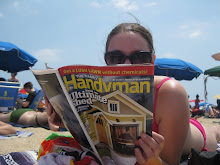Give Me the Whole Truth, Not a Million Little Pieces of the Truth


Uh-O(prah). Memoirist James Frey, author of the best-selling book, Million Little Pieces, has been accused of fabricating elements of his compelling druggie/alcoholic life story. That would be fine if the book sold as a realistic fiction novel, but he claimed it was nonfiction. Wait. I'm surprising myself. Yesterday when I read about this, and how the Smoking Gun Web site supposedly caught him, I was on the author's side. I didn't think there was enough evidence to support reports that he made stuff up. Now I'm switching teams. Interesting. Whether or not every word is true or if he exaggerated like whoa, this literary battle brings up an issue that's ever present in the creative nonfiction/literary fiction world.
When writing in this genre, what are the truth boundaries and limits? Should everything be fact or does the writer have liberties?
A reporter from the Chicago Tribune called the office today looking to interview my editor about this very subject. I found out people had been calling him all day yesterday and this morning, since he has written about and given talks about this aspect, or debate, I suppose, of creative nonfiction.
By my standards, if you're writing something and calling it creative NONFICTION, it better be nonfiction. Don't make stuff up. If you want to do that, call it a novel. If you taint the creative nonfiction genre, you ruin it for the writers that stick to the facts, ma'am. This can be a struggle, but only if you let it. Sometimes when writing creative nonfiction it may seem as if you'll write the best essay ever composed if the story you're covering ended another way. Maybe it's tempting to slide the truth so your themes or messages work out. Don't. Change your angle. Don't resort to fabrications. The creative part of creative nonfiction refers to how the facts are told-- the (true) story that drives a piece.
Even in memoir, when writing about something that occurred 20 years ago, truth is imperative. Maybe it's not possible to write word for word dialogue that took place between you and cousin Fred when you were five; however, if you recapture the conversation to the best of your mind's ability, it still qualifies as nonfiction.
If you need a little more help with this, simply remember to keep the reader in the know. If you say things like "it probably went something like this..." or "as I remember it..." you can save yourself from looking like you're trying to fool the reader into believing your memory is a perfect account of the past.
And yet, the fuzziness of fact and fiction doesn't end there. For example, in one the most highly acclaimed recently written memoirs, The Liar's Club (great book), the author Mary Karr takes some liberties. When describing a sexual molester of her youth, she tells of glasses and braces. No one in her neighborhood had that combination, but she didn't want the real pervert to be recognized in her book, which he would have been had she described him accurately. Even after my rant of sticking with the truth, I'm OK with that. It doesn't trick the reader and it doesn't change the story.
Ultimately it's the writer's call, but I will always crusade for absolute nonfiction. While we're on this topic, what's the deal with so many important people lying? Stem cells? Um, all of Washington, D.C.? Not that lying is anything new, but the chances of getting caught have never been higher. Everybody watches everyone do everything. Why do people think they'll get away with stuff? Didn't they end that stage in high school like most of us? Baffles me.


3 Comments:
What gets me is the "I don't recall" excuse, used most recently by Sam Alito in regards to Ted Kennedy's assault on his membership in Concerned Alumni of Princeton. "I don't recall" is not a yes, not a no, and not a grown-up response.
Also, there are no truths. Only perceptions.
now i tend to side with the smoking gun on the stance that he should have told the complete truth, but oprah makes a good point: he did still overcome the battle and in that way can still serve as an inspirational model for finishing something we start. although if i said that i climbed mt everest and fabricated a story telling of my adventures into thin air when all i really did i was climb cardiac hill in oakland, i don't know how much of an inspiration i would actually be. just a thought...
of course i'm sure you've heard about this already...
Oh Oprah...
thoughts?
Post a Comment
<< Home